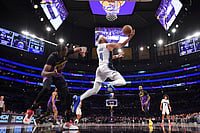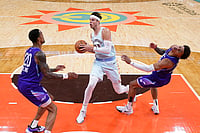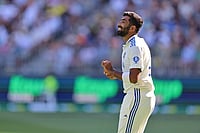The promulgation of the reforms in Indian sports administration has just been put on hold – yet again – and no one knows when transparency and accountability will be implemented in full force. This time, the postponement has come after the Delhi High Court stayed a 13-member committee from proceeding to review the draft of the National Code for Good Governance in Sports-2017 (NCGGS 2017) seeking reforms, but is being opposed by some stakeholders. (More Sports News)
As per its terms of reference, the committee, headed by Justice (Retired) Mukundakam Sharma of the Supreme Court, has been tasked to “review” the draft Code, and examine the comments of the Indian Olympic Association (IOA) and the National Sports Federations (NSFs) who have opposed the 2017 Code. The third point of the terms of reference is the most crucial. It wants the committee to “suggest measures/changes for making the draft acceptable to all the stakeholders so that there is sync between the government and all stakeholders and balance is struck between autonomy of the NSFs vis-à-vis need for transparency and accountability”.
The committee includes five distinguished present/former sportspersons – Gagan Narang, Pullela Gopichand, Anju Bobby George, Bhaichung Bhutia, and Adille Sumaraiwala, besides a representative of the IOA, presidents of the boxing, kho-kho, and weightlifting national federations, Sports Authority of India (SAI) Director General/his nominee, and principal secretary (sports) of Kerala. Joint secretary (sports) in sports ministry is the coordinator of the committee.
Justice Sharma said that his committee, which was constituted on November 26, did not meet even once. “I had convened a meeting of the committee on December 10, but the Delhi High Court has granted a stay order. The sports ministry had sent me some papers. But, unfortunately, we could not meet before the stay order came,” Justice Sharma told Outlook.
Delhi-base lawyer Rahul Mehra had moved the application, in a related ongoing case, for the stay that was granted on December 6. He has been seeking transparency and accountability in Indian sports administration for years, and now fears “dilution” of the 2017 draft Code as the beneficiaries would be certain people, including a few veteran sports administrators.
Mehra’s main reasons for moving the application for stay is that he feared that the 2017 draft Code would be diluted and that most of the members on the 13-member committee have conflict of interest. He also says that the rest of the members are under “direct control of the government”, so the committee cannot be objective in its dealings.
“...and the Petitioner verily believes that all salutary provisions of the Sports Governance Code, and even the Sports Code, will be watered down if the Respondent No. 1 [Union of India] is permitted to continue with its current misadventure,” says Mehra in his application, referring to the committee. “The committee be restrained from proceeding further with its commission, a fortiori given the extensive conflicts of interests involved.”
Mehra has also prayed to the court that the Union government be asked to submit with the Delhi High Court all the objections that it has received from the IOA and the NSFs. The IOA last month wrote to the sports ministry, saying it rejects the 2017 Code that puts age (70 years) and tenure caps for sports administrators.
“We, the IOA and all our members [NSFs], outrightly reject the new Draft Sports Code as it interferes in the autonomy of the IOA and its members. The Sports Code was discussed with ministry of sports and implemented in 2014 in IOA Statutes which enabled IOA to regain its recognition in 2012,” IOA secretary-general Rajeev Mehta said in the feedback letter sent to the sports ministry. Earlier, on October 11, Sports Minister Kiren Rijiju had sought feedback of the IOA and the NSFs on the 2017 draft Code.
But Mehra’s application seeking a stay on the work of the Justice Mukundakam Sharma Committee would be deferred indefinitely and, therefore, implementation of transparency and accountability in Indian sports administration will be hit badly. “It depends on further proceedings [in the court], but I feel this will ensure some sanity and also insulate the revised Code from getting diluted at the hands of vested-interest groups,” Mehra told Outlook.
















